Key takeaways:
- Smart cities utilize technology and data integration to enhance urban living, improving commuting, public service access, and community engagement.
- Key benefits of smart cities include improved quality of life, economic growth, environmental sustainability, enhanced public safety, and increased citizen engagement.
- Challenges in implementation include privacy concerns, funding limitations, and integrating new technologies with existing infrastructure.
- The need for inclusivity in smart city initiatives is crucial to ensure that all communities benefit from advancements and innovations.
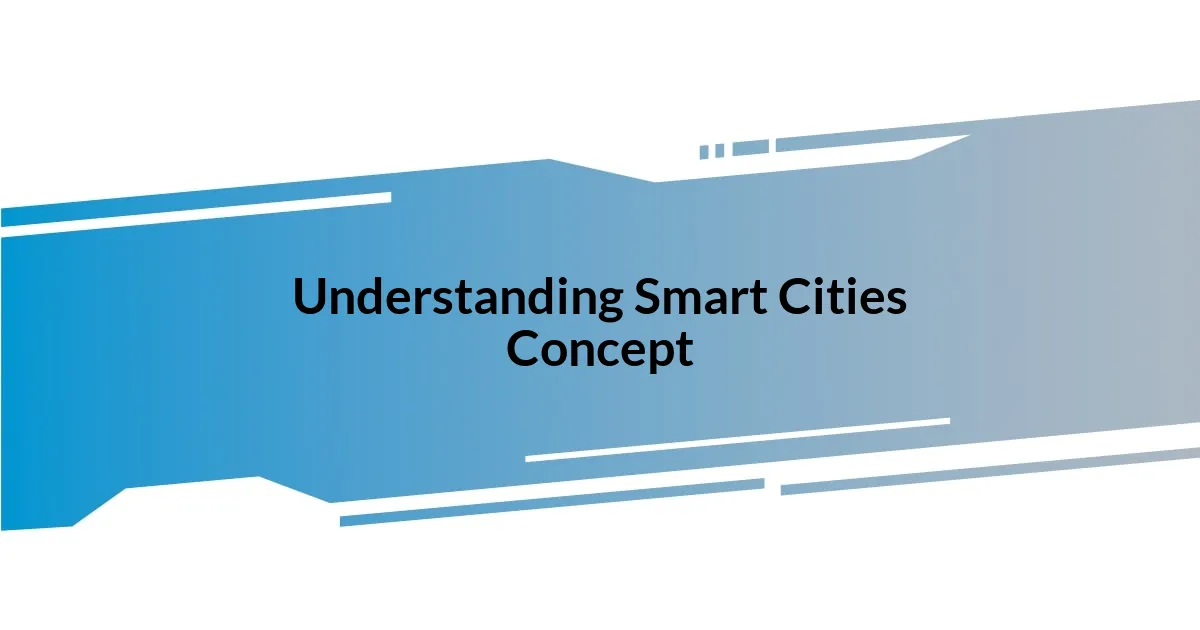
Understanding Smart Cities Concept
The concept of smart cities revolves around integrating technology and data to enhance urban living. I often find myself imagining how my daily routine could change with these advancements. For instance, wouldn’t it be incredible if traffic lights adjusted in real-time based on live traffic data, reducing my commute time significantly?
When I think about smart cities, I can’t help but reflect on the seamless connectivity they promise. Imagine a place where accessing public services is as easy as tapping your phone. This idea resonates deeply with me, as I remember the frustrations of navigating outdated systems when trying to report a maintenance issue in my neighborhood.
I also find it fascinating how smart cities could foster a greater sense of community. By leveraging technology, residents might engage more with each other through localized platforms. What if a neighbor could share a ride to work or a community garden was just a click away? This imagined future feels not only efficient but also deeply connected.
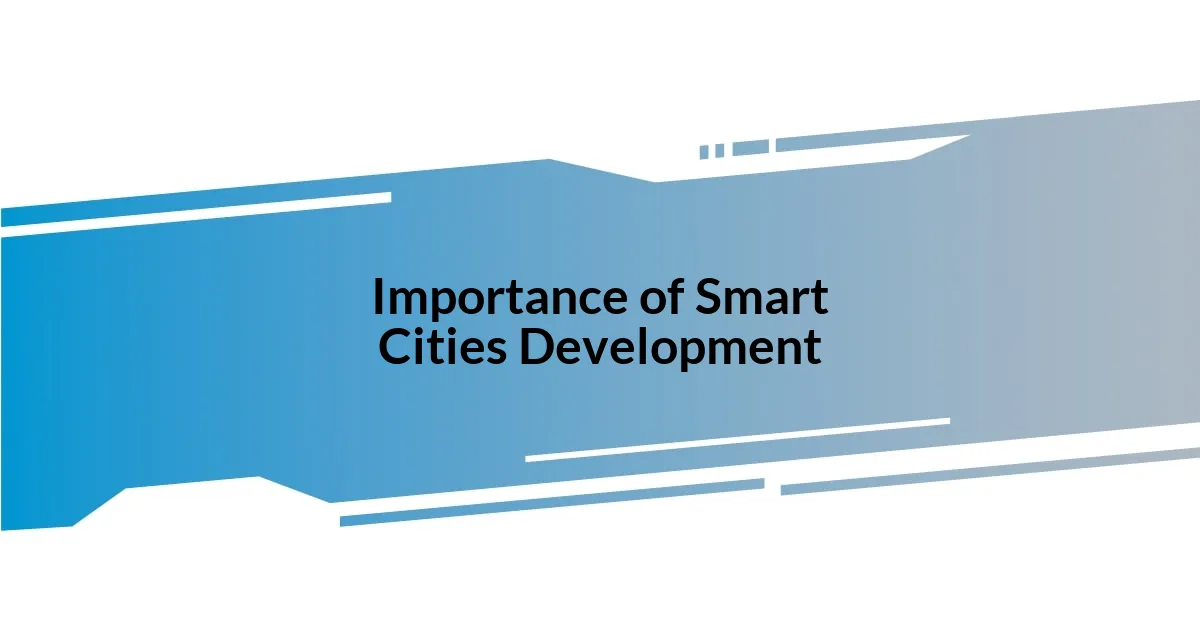
Importance of Smart Cities Development
The importance of smart cities development is palpable in today’s urban landscape. I often think about how cities can transform everyday life through efficient management of resources. For example, when I see the wastefulness of overflowing garbage bins on my street, I can’t help but visualize a smart waste management system that utilizes sensors to notify collection services only when bins are full. This proactive approach not only keeps our neighborhoods cleaner but also optimizes city resources effectively.
Here are a few key reasons why the development of smart cities matters:
- Improved Quality of Life: Smart technologies can significantly enhance daily living, from easier access to public services to improved health facilities.
- Economic Growth: By attracting tech companies and innovative startups, smart cities can create jobs and stimulate local economies.
- Environmental Sustainability: With smart solutions like energy-efficient buildings and smart grids, cities can reduce their carbon footprint and promote cleaner environments.
- Enhanced Public Safety: Real-time data can improve emergency response times, making our cities safer for everyone.
- Citizen Engagement: With increased accessibility to information and services, residents can have a more active role in their communities.
Reflecting on these points, I remember a time when a neighbor faced a safety issue due to delayed emergency response. I can’t help but think how different their experience could have been if our city had real-time monitoring systems already in place. Smart cities hold the potential to prevent such situations and foster thriving, engaged communities.
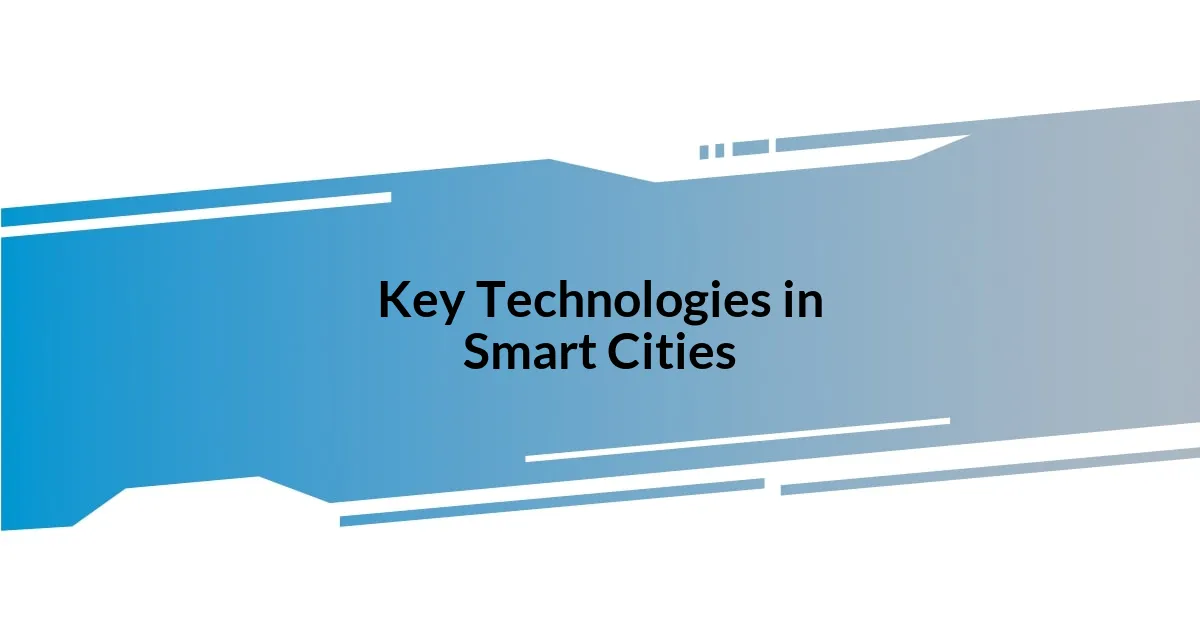
Key Technologies in Smart Cities
When discussing key technologies in smart cities, one cannot overlook the significance of the Internet of Things (IoT). It connects devices and systems, allowing them to communicate and respond in real time. I personally remember visiting a smart home demo, where the lights adjusted automatically as the room filled with people. It made me realize that if similar technology was applied citywide, streetlights could brighten or dim based on pedestrian traffic, ultimately boosting safety in our neighborhoods.
Equally crucial are big data analytics and cloud computing. These technologies enable cities to analyze vast amounts of information to improve decision-making. I often think about my own city’s traffic management. If it utilized data analytics, it could effectively reroute traffic during accidents, minimizing disruption. It reminds me of when I missed an important appointment simply because I was stuck in an unexpected jam. Leveraging real-time data could spare others from that frustration.
Additionally, smart grids transform energy distribution and consumption. By integrating renewable energy sources and promoting energy efficiency, cities can enhance sustainability. This concept resonates with me deeply; I recently installed energy-efficient appliances at home, and it not only reduced my bills but also gave me a sense of contributing to a greener planet. I’m excited to think that smart grids could amplify such individual efforts across the entire city.
| Technology | Description |
|---|---|
| Internet of Things (IoT) | Connects devices for real-time communication, enhancing urban services. |
| Big Data Analytics | Analyzes large datasets for informed decision-making to optimize city operations. |
| Smart Grids | Enhances energy efficiency and incorporates renewable sources into the power supply. |
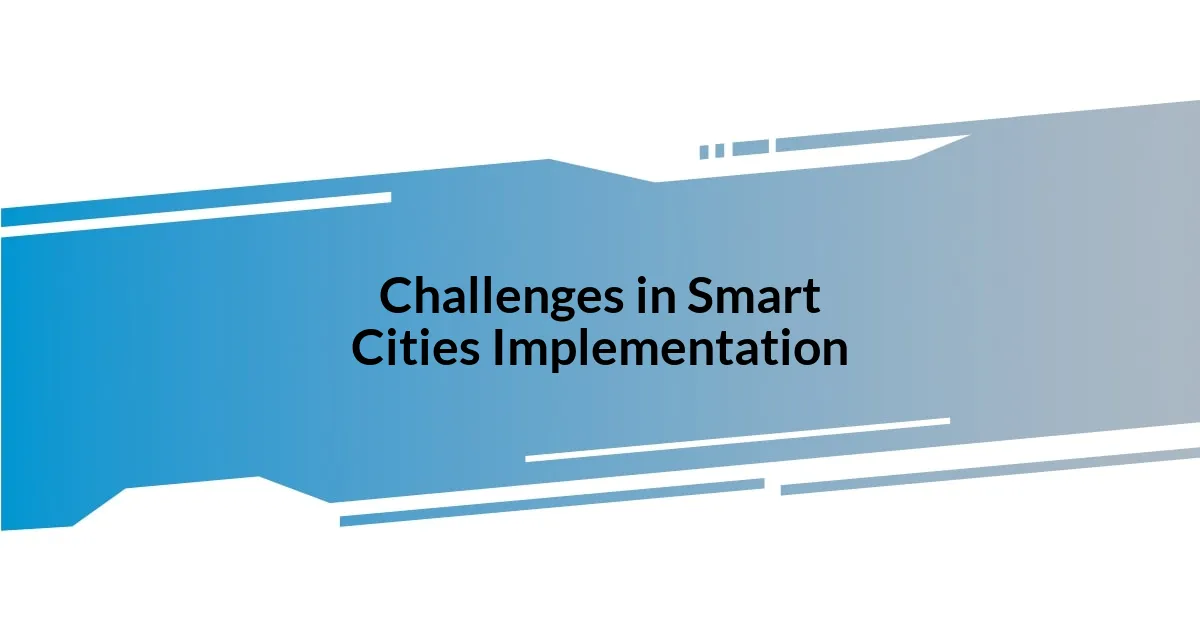
Challenges in Smart Cities Implementation
Implementing smart cities comes with a slew of challenges that can often be overwhelming. I recall a city council meeting where residents expressed their concerns about privacy. With all the data collected—think traffic patterns and air quality monitoring—how do we ensure it doesn’t infringe on personal lives? It’s a delicate balance between providing better services and maintaining trust with the community.
Funding is another significant obstacle I often encounter in discussions about smart city projects. I remember a time when a local initiative for smart street lighting was proposed but shot down due to a lack of budget. How can cities move forward with ambitious plans if they can’t secure financial backing? It’s frustrating to see potential improvements stifled by monetary constraints, especially when so many technologies could greatly enhance urban living.
Lastly, there’s the problem of integrating new technologies with existing infrastructure. I once watched a documentary on a city attempting to install a smart water management system alongside its aging pipes. The complications and costs escalated quickly, leaving me wondering: is it worth the effort? I believe the real challenge lies in harmonizing innovation with what we already have, ensuring that we move towards a smarter future without losing sight of practical realities.
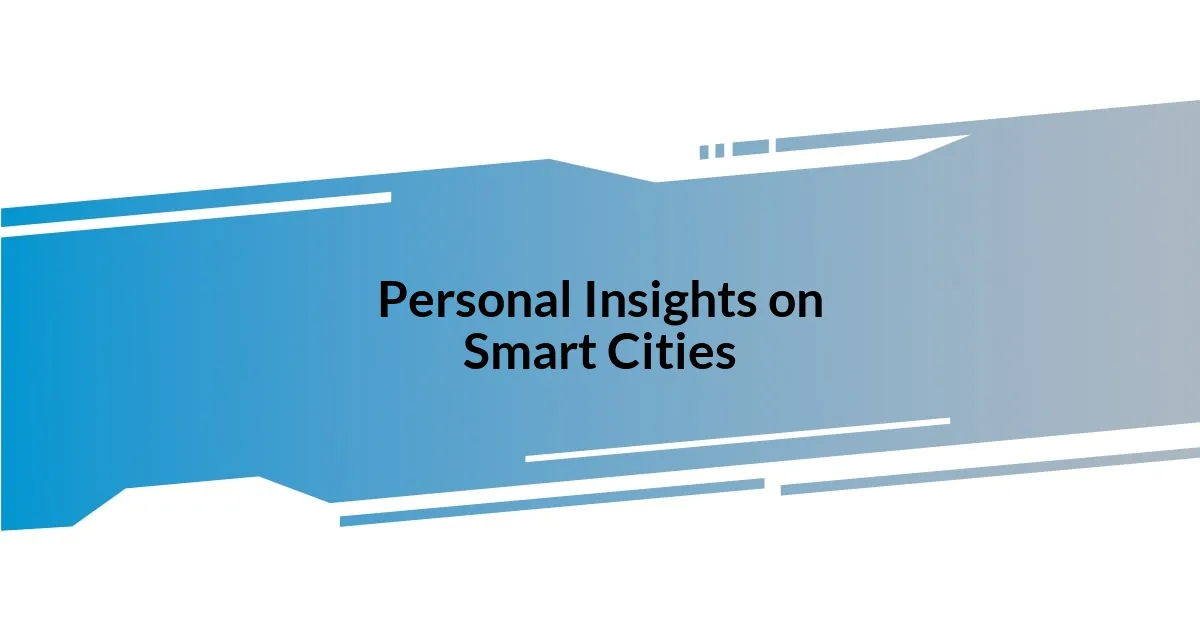
Personal Insights on Smart Cities
When I think about the development of smart cities, I’m often struck by how much potential they hold to transform daily life. Just the other day, I found myself daydreaming about a city where public transportation runs seamlessly, powered by real-time data. Wouldn’t it be amazing to step outside and know exactly when the next bus or train will arrive? The thought not only excites me but makes me realize how this kind of efficiency can also reduce stress and make urban living far more enjoyable.
I also feel a sense of urgency regarding the inclusivity of smart city projects. I recall chatting with a friend who lives in a historically underserved neighborhood. He expressed his worries that smart city initiatives often overlook such communities, widening the gap instead of bridging it. Isn’t it essential to involve everyone in this progress, ensuring all voices are heard? This insight has stuck with me, emphasizing that innovation should not just be about technology but about improving lives for everyone, regardless of their background.
The environmental aspects of smart cities resonate deeply with me as well. I once attended a sustainable urban development forum where experts discussed green roofs and urban farming. Picture a city where rooftops contribute to food production and air quality! It made me think of how I personally started a small vegetable garden at home. If every city dweller engaged in similar initiatives, even on a tiny scale, imagine the collective impact we could have on urban sustainability. These experiences have certainly shaped my belief that smart cities must be as much about community as they are about technology.